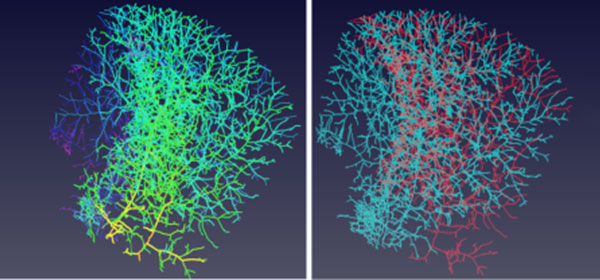The Commonwealth Scientific and Industrial Research Organisation (CSIRO) has developed a computer algorithm that, along with scans of blood vessels, can predict cancer early.
For cancerous cells to grow they must have a supply of nutrients that come from blood vessels. These blood vessels can now be mapped to locate early-stage cancers with a new algorithm that improves scanning results, making them finer and more accurate.
Tumours are abnormal cells that need blood to survive. A tumour turns from a mass to a life-threatening growth when a process called angiogenesis occurs. This is when blood carries nutrients and oxygen to the tumour and removes its waste products. Tumours release ‘signal proteins’ which tell the body to produce new blood vessels to help saturate the site with nutrients and oxygen, thus making the tumour grow.
If a tumour’s blood supply is cut off, the tumour dies.
Understanding how angiogenesis works will help scientists work out how to stamp out tumour growth early, by restricting the proliferation of blood vessels in the area.
Researchers have worked to develop finer scanning of minute blood vessel tips to help make this process possible.
The algorithm developed by the CSIRO in conjunction with the Shanghai Institute of Applied Physics, Chinese Academy of Sciences, reveals the intricate nature of new blood vessel tips and brings us one step closer to figuring out how to stamp out tumours before they run rampant.
“Our robust algorithms for the early detection and quantification of angiogenesis could potentially be a great step forward in the detection and treatment of cancer,” said lead researcher Dr Dadong Wang.
Read more about this amazing evolution in science at CSIRO
Isn’t this great news?
Related articles:
Cancer can be a result of bad luck
Cancer: what tests to have and when to have them
Breast cancer surgery breakthrough

